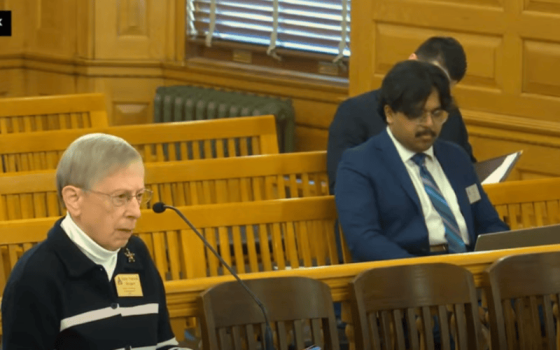
Sr. Therese Bangert of the Sisters of Charity of Leavenworth offered the only in-person testimony during a Kansas House committee hearing on a resolution directing Gov. Laura Kelly to support President Donald Trump's immigration enforcement agenda. No one spoke in favor of the resolution. (Sherman Smith/Kansas Reflector)
Sr. Therese Bangert stood alone before the House Federal and State Affairs Committee to denounce a resolution urging Gov. Laura Kelly to do everything in her power to support the immigration enforcement agenda of President Donald Trump.
Bangert, who has been with the Sisters of Charity of Leavenworth for more than 60 years, said the nation's immigration system had been broken for decades. By default, she said, the federal government had allowed migrant laborers to fill jobs in the United States without extending to those individuals an accessible path to legal residency or citizenship.
She said people targeted by the Kansas Senate-approved resolution were Kansans in every way except for possession of U.S. immigration documents.
"I suspect these are the immigrant women who are milking cows in the western Kansas dairy industry, the men and women on the killing floors of Kansas slaughterhouses and those roofing the homes in my neighborhood," said Bangert, who was worried they were all vulnerable to deportation. "I find troubling the heated rhetoric when speaking about our sisters and brothers who are immigrants."
No one showed up at the House hearing to argue in favor of Senate Concurrent Resolution 1602. Likewise, there was no one present to articulate a neutral position. Wichita Republican Rep. Tom Kessler, chairman of the House committee, said written testimony lauding the resolution had been submitted, but it wasn't publicly available.
When the Senate conducted its hearing in January on the resolution, Bangert wasn't given the opportunity to speak to lawmakers. Sen. Mike Thompson, chairman of the Senate Federal and State Affairs Committee and sponsor of the resolution, said Bangert needed to notify the committee 24 hours in advance to be granted permission to testify. Proponents of the measure, including Attorney General Kris Kobach, were permitted to address Thompson's committee.
The Senate went on to approve the resolution on a party-line vote of 31-9. It was expected to pass the House by a wide margin.
During the House committee hearing, Rep. Susan Ruiz, D-Shawnee, noted the absence of a throng of in-person witnesses to argue on behalf of the Senate resolution.
"There is no one here as a proponent, which I find really odd," Ruiz said.
The void was partially filled by Republicans on the House committee who offered commentary demonstrating their sense that Kansas governors ought to authorize use of state resources to help patrol the national border, including deploying Kansas National Guard troops, and to assist with Trump's strategy of detaining and deporting thousands or millions of people. There was no evidence of support for a concurrent crackdown on Kansas businesses hiring people without proper documentation.
Advertisement
Rep. Brian Bergkamp, R-Wichita, said the state and nation needed a higher standard of border security to address immigration among people without permission to remain temporarily or permanently in the United States. The security concept mirrored justification for a metal-detector at the main entrance to the Capitol instead of relying on an antiquated open-door policy for visitors, he said.
"I definitely stand for immigration," Bergkamp said, "but in a more orderly fashion."
GOP Rep. Kyle McNorton of Topeka said it was wrong for anyone to view people in the country without permission as law-abiding individuals.
"They broke the number one law coming across our border without permission and are still here," McNorton said.
In response, Wichita Democratic Rep. Angela Martinez said the majority of people in the United States without authorization had overstayed a Visa rather than entered by sneaking across the border in defiance of immigration authorities.
"I support the deportation of criminals," said Martinez, who was temporarily placed on the committee to coincide with debate on the resolution. "I ask this committee to sit and be honest with yourself. If you were subject to violence and tyranny and you couldn't support your children and there was an opportunity for a better life … would you go?"
Rep. John Alcala, a Topeka Democrat among temporary appointments to the committee, said proponents of the resolution hadn't taken into account economic harm that would fall on Kansas if full deportation occurred.
He said the National Immigration Law Center estimated Kansas' workforce was comprised of thousands of people without documents to stay in the United States. He said an NILC study indicated there were 25,000 in manufacturing, 17,000 in food service and 16,000 in construction. In 2020, he said, NILC estimated those workers paid more than $600 million in state and federal taxes.
"I don't think people realize what the impact will be on businesses that are struggling with labor shortages," Alcala said. "How are we going to offset that economic loss? Can Kansas afford that loss of revenue? I don't think so."
Lawrence Rep. Brooklynne Mosley, a Democrat, said issues of human dignity and moral injury might not have been considered by champions of the resolution.
"What does that do to the cloth of a community when they start to see families being ripped apart?" she said.






